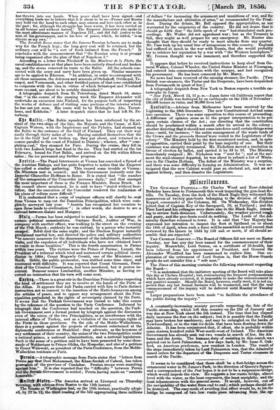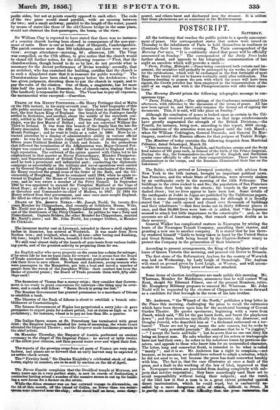atioullauton
Tun GUN-BOAT FLOTILLA.—Sir Charles Wood and Rear-Admiral Berkeley have.been-to Portsmouth-this week inspecting the gun-boat-flo- tilla. On Tuesday, from the deck of the Black Eagle they witnessed the manoeuvres of twenty gumlboats belonging to the division of Captain Keppel, commander of the Colossus 80. On Wednesday, this division joined that of Captain Key of the Sanspareil, 70, at Portland ; and the First Lord and his colleague were there also in the Black Engle, intend- ing to review both divisions. Unfortunately, the weather proved rough and gusty, and the gun-boats could do nothing. The Lords of the Ad- miralty therefore returned to town. It is said that "her Majesty has expressed her intention to inspect the fleet at Spithead on or about the 16th of April, when such a force will be assembled as will exceed-that reviewed by the Queen in 1863 by 160 sail or more, if all should as- semble that are expected."
Tam CRIMEAN Iistanniv.—The Board of Officers did not meet on Easter Tuesday, nor has any day been named for the commencement of their inquiry. Meanwhile, Lord Seaton, on a certificate of ill-health, hag been relieved from his appointment as President, and General Sir Alexander Woodfbrd has been summoned to replace him. One ex- planation of the retirement of Lord Seaton is, that •the Horse Guards people do not oonsider him a " safe man."
The Times of this morning contains the following statement respecting the Board-
" It is undemtood that the initiatory meeting of the Board will take place this day at Chelsea Hospital ; but, remembering the frequent postponements which have already occurred, it is impossible to make the announcement in any poaitive manner. Should the Board, however, really meet, it is not ex- pected that any but formal business will be transacted, and that the real commencement of the inquiry will be deferred until Monday or Tuesday next."
Larger preparations have been made "to facilitate the attendance of the public during the inquiry."
A constantly-increasing anxiety prevails respecting the fate of the Pacific steam-ship, which left this country on the 23d of January and was due at New York about the 5th instant. The time that has elapsed daily increases the fear on the subject ; but it is possible that the Pacific may have broken her machinery, and may be entangled on the banks of Newfoundland, or in the vast ice-fields that have been floating down the Atlantic. It has been conjectured, that, if afloat, she is probably within some sixteen hundred miles West-north-west of Ireland. The American Government has already sent out two vessels in search of her, the Ala hams and the Arctic. The humane duty of assisting in this search wa s pointed out to Lord Palmerston, a few days back, by Mr. Isaac S. Oak- ford, an American gentleman, now resident in London. The result of the steps immediately taken by Lord Palmerston was, that the Admiralty issued orders for the departure of the Desperate and Tartar steamers in search of the Pacific.
It seems to be considered that there- shall be a foot-bridge across the ornamental water in St. James's Park, in the direction of Queen's Square; and a correspondent of the Post hopes it is not to be a suspension-bridge, which would impede the view. He suggests a low rustic bridge, almost level with the water, as the least expensive, the least unsightly, and the least inharmonious with the general scene. It would, however, cut off the navigability of the water from end to end ; which perhaps should not be destroyed. The easy mode of avoiding that effect would be, to let the bridge be ,composed of two low rustic piers advancing from the op- posite aides, but not at points exaotly opposed to each other. The ends of the two piers would stand parallel, with an opening between the two ; and .a small archway, parallel to the length of the water, passed by means of stairs like those of the old Chinese bridge in the same place, would not obstruct the foot-passengers, the boats; or the view.
Sir William Clay is reported to have stated that there was no instance of a country church having been (dosed in consequence of the non-pay-• meat of rates. Here is one at hand—that of Shepreth, Cambridgeshire. The parish contains more than 300 inhabitants, and there were two ser., vices : average attendance—morning, 90 ; afternoon, 120. The Vicar was compelled, on the 17th ultimo, to give notice that the church would be closed till further notice, for the following reasons—" First that the churchwardens, though bound to do so by law, do not provide what is necessary for the decent performance of divine worship : secondly, that an architect, who has examined the building, certifies that the church is in such a dilapidated state that it is insecure for public worship." The Churchwardens have been cited to appear before the Archdeacon ; who has given judgment, directing them to put the church in repair, and to pay the costs of the citation. One of them, a magistrate, has let more than half the parish to a Dissenter, free of church-rates, stating that he (the landlord) is responsible for them. The Vicar has to pay all expenses, the sacramental wine excepted.—Guardian.
DrAnt OF Sin Hmenv Porriseten—Bir Henry Pottinger died at Malta on the 18th instant, in his sixty-seventh year. The brief biography of this able public servant states that he was the thirty-first in descent fromEg- hert, the first Saxon King of 'England. One branch of the Pottinger family settled in Berkshire, and another, about the middle of the sixteenth cen- tury, settled in the North of Ireland. Thomas Pottinger, of Mount Pot- tinger, was the first Mayor of Belfast ; and his son conveyed William the Third to Ireland. It was from this branch' of the family that the late Sir Henry descended. He was the fifth son of Edward Curwen Pottinger, of Mount Pottinger; and he went to India as a cadet in 1804. Here he at- tracted attention by a display of administrative ability in various official posts : he was for seven years Judge and Collector of Aionednugger, for fifteen years Political Resident at Cuteh and Scinde. In the promotions that followed the termination of the A-thanistan war, Major-General Pot- tinger was created a baronet; and in 1840 he returned to England with a high reputation. The -outbreak of the opium quarrel with China led to his employment in that quarter as Envoy Extraordinary, Minister Plenipoten- tiary, and Superintendent of British Trade in China. In the war that en- siled he took a prominent and influential part ; conducting the diplomatic -campaign as sueeessfally as the military-and naval operations were carried an by General Gough and Admiral Parker. On the conclusion of the treaty, Sir Henry received the grand cross of the Order of the Bath, and the Go- vernorship of Hongkong. Here he remained until 1844, when he again re- terned to England : the House of Commons voted him a pension of 1500/. a veer, and he was sworn a member of the Privy Council. In September. 1846 he was appointed to succeed Sir Peregrine Maitland at the Cape of Good Hope ; an office he held for a year; but quitted it on his appointment
as Governor and Commander-in-chief of Madras, in 1847. 1864 Sir Henry retired from that government, and once once more sought England. He filled no other-post in the public service.
Iinsen or Mn. loses NEELD.-Mr. Joseph Neeld, for twenty -Eve - years Member for Chippenham died recently at Grittleton House Wilts. Mx. Neeld was also a Magistrate, Deputy-Lieutenant for the county, and one of the Gentlemen of the Privy Chamber. In polities he was a Tory and Protectionist. Captain Boldero, the other Member for Chippenham, married Mr. Neeld's sister; and Mr. John Neeld, .his younger brother, is Member for Cricklade.
The immense mortar cast at Liverpool, intended to throw a shell eighteen inches in diameter, has arrived at Woolwich. It was made from Nova Scotian iron • and weighed, when cast, 25 tons—after boring and finishing, 14 tans ; length 7 feet 6 inches, breadth 3 feet 9 inches.
, We still read almost daily of the launch of gun-boats from various build- ingsyards, and of the greatest activity in preparing them for sea.
An English sailor who saves property on the ocean has a claim for salvage; if he saves life he has no legal claim for reward : but it seems that the Board of Trade sometimes rectifies this, by munificent gratuities--to seamen who risk their lives to save others. Newham and Anderson, young seamen who were passengers in the Mangerton got into a boat and saved a number of people from the wreck of the Josephine Willis : their conduct has been the theme of general praise ; the Board of Trade presents them with fifty shil- lings each !
The financiers of Vienna fear a money crisis ; they consider that Govern- ment is too ready to grant concessions for railways—the thing may be over and a crash will follow. "Baron Bruck is going too fast"
The Russian Government has granted permission to a merchant of Odessa to establish a bank.
The Director of the Bank of Athens is about to establish a branch esta- blishment at Constantinople.
The fatuous Government of Naples has perpetrated a miry joke—it gave permission to export grain for a short period, but at duties so high as to be prohibitory; for instance, wheat is to pay no less than 20s. a quarter.
The Italian Opera season at St. Petersburg has terminated with great Flat: the Emperor having finished his term,of mourning, the whole Court attended the Imperial Theatre ; and the Emperor made handsome presents to the ehief artists.
On Maunday Thursday, the Emperor of Austria performed an ancient ceremony in the chapel of the Imperial Palace : he served at table twelve of the oldest poor citizens, and then poured water over and wiped their feet.
The reports of the growing crops from all parts of France are very satis- factory, and plants are so forward that an early harvest may be expected if no severe check occurs.
The:" Fawsley herd," Sir.Charles Knightley's celebrated stock of short- horns, eighty in number, are to-be sold by auction on the 3d of April.
The Ferree Gazette complains that the Druidical temple at Moyness, not many years ago in a very perfect state, is now in course of destruction, a contractor having seized a number of the massive stones to cut np for build- ing a new house for a farmer on the estate.
While the Alma steamer was on her outward voyage to Alexandria, °a- the 2d of this month, off the island of Galita, no fewer than ten water- sfoUts. were observed near.the ship ; after about half an hour, some &sap-
peered, and others burst and discharged near the steamer. It is seldom that these phenomena are so numerous in the Mediterranean.



























 Previous page
Previous page